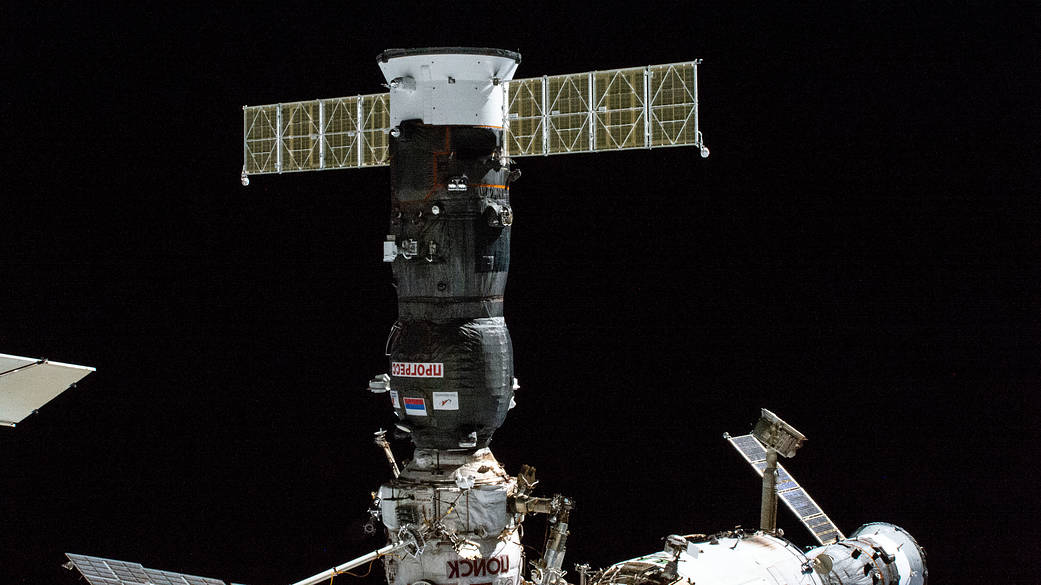Russian Progress cargo craft at space station springs a leak

Breaking space news, the latest updates on rocket launches, skywatching events and more!
You are now subscribed
Your newsletter sign-up was successful
Want to add more newsletters?

Delivered daily
Daily Newsletter
Breaking space news, the latest updates on rocket launches, skywatching events and more!

Once a month
Watch This Space
Sign up to our monthly entertainment newsletter to keep up with all our coverage of the latest sci-fi and space movies, tv shows, games and books.

Once a week
Night Sky This Week
Discover this week's must-see night sky events, moon phases, and stunning astrophotos. Sign up for our skywatching newsletter and explore the universe with us!

Twice a month
Strange New Words
Space.com's Sci-Fi Reader's Club. Read a sci-fi short story every month and join a virtual community of fellow science fiction fans!
For the second time in two months, a Russian spacecraft docked with the International Space Station (ISS) has sprung a leak.
Mission controllers in Moscow have noticed "a depressurization" in the robotic Progress 82 cargo craft, Russia's federal space agency Roscosmos announced on Saturday (Feb. 11).
The depressurization occurred in the Progress vehicle's coolant system, NASA officials said.
"The reason for the loss of coolant in the Progress 82 spacecraft is being investigated. The hatches between the Progress 82 and the station are open, and temperatures and pressures aboard the station are all normal," NASA officials wrote in a blog post on Saturday. "The crew, which was informed of the cooling loop leak, is in no danger and continuing with normal space station operations."
Related: Hole in leaky Soyuz spacecraft not caused by Geminid meteor
Progress 82 arrived at the ISS on Oct. 28, 2022 and was scheduled to depart on Feb. 17. It's unclear if the freighter will still leave on that date or if mission controllers will keep it around longer than originally planned to continue the leak investigation. (Progress vehicles are designed to burn up in Earth's atmosphere when their missions are over, so engineers won't be able to examine the vehicle on the ground.)
Coincidentally, the depressurization was noticed on the same day that another Russian freighter, Progress 83, arrived at the orbiting lab. Progress 83 docked successfully early Saturday morning, unaffected by the travails of its sibling ship.
Breaking space news, the latest updates on rocket launches, skywatching events and more!
Progress 82's leak follows on the heels of a similar incident involving Russia's MS-22 Soyuz spacecraft, which carried three astronauts to the International Space Station in September and was supposed to haul them home again in March.
But Soyuz MS-22 leaked away all of its coolant on Dec. 14, a dramatic event that Russian mission controllers eventually traced to an apparent micrometeoroid strike. The vehicle is now unfit to carry astronauts except in case of an emergency aboard the ISS, so Roscosmos plans to launch another Soyuz later this month to take its place.
That replacement Soyuz, known as MS-23, will launch uncrewed. It will bring the MS-22 crew — cosmonauts Dmitri Petelin and Sergey Prokopyev and NASA's Frank Rubio — back to Earth, likely in late September.
That's the current plan, anyway. It's unclear at the moment if Roscosmos and the other space station partners will adjust it, perhaps to allow more time to conduct a Progress leak investigation and consider the implications of its results.
Mike Wall is the author of "Out There" (Grand Central Publishing, 2018; illustrated by Karl Tate), a book about the search for alien life. Follow him on Twitter @michaeldwall. Follow us @Spacedotcom, Facebook and Instagram.

Michael Wall is a Senior Space Writer with Space.com and joined the team in 2010. He primarily covers exoplanets, spaceflight and military space, but has been known to dabble in the space art beat. His book about the search for alien life, "Out There," was published on Nov. 13, 2018. Before becoming a science writer, Michael worked as a herpetologist and wildlife biologist. He has a Ph.D. in evolutionary biology from the University of Sydney, Australia, a bachelor's degree from the University of Arizona, and a graduate certificate in science writing from the University of California, Santa Cruz. To find out what his latest project is, you can follow Michael on Twitter.
